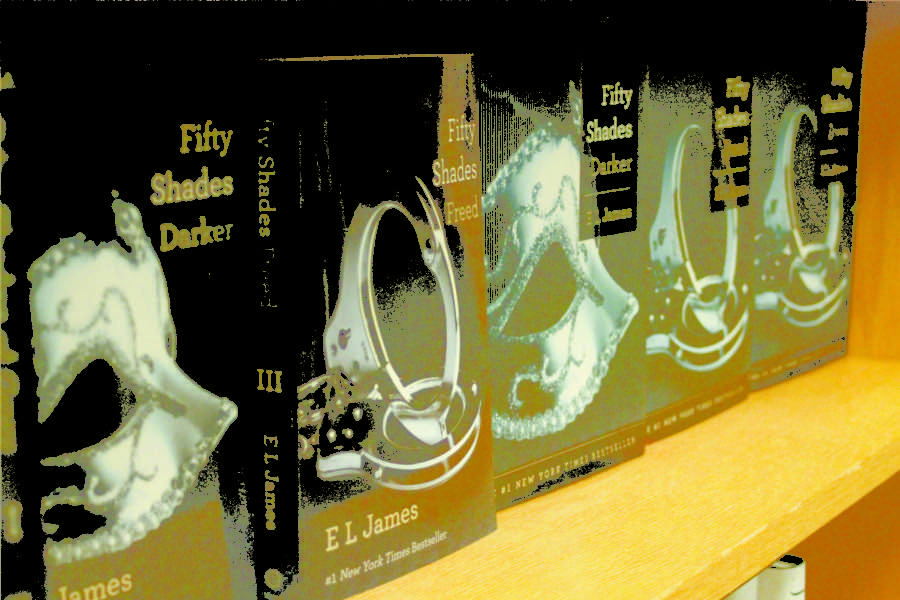Liu: Romance novels, like porn, yield unrealistic expectations
Tiffany Herring/Iowa State Daily
Many females admit to having read at least a couple of romance novels. Romance novels account for more than 55 percent of the revenue in fiction books, generating an estimated $1.35 billion last year.
March 11, 2014
As a female, I’m going to make an embarrassing confession: I read romance novels and more than I would like to admit. The dark, handsome, brooding men of each story dominated my daytime fantasies. Back in the days, I would huddle with them at night under the blanket with a flashlight, praying that my parents would not stumble upon my literary escapades. One book led to another, and soon romance novels became an obsession, an escape from reality.
All my female friends timidly admit to having read at least a couple books under this genre, and the numbers prove this true. Romance novels account for more than 55 percent of the revenue in fiction books, generating an estimated $1.35 billion last year, topping even religious and inspirational fiction, the next competing category, which made about $717 million. Not only is romance the top-performing category on the best-seller lists, surveys show that readers of this sub-genre are loyal customers who would continuously buy these novels with somewhat questionable content.
Most of these books have unrealistic scenarios where two people fall in love. While most women don’t see any harm done in the occasional indulgence of these romantic fancies, many parallels have been drawn between romance novels and pornography.
As pointed out by researchers Ogi Ogas and Sai Gaddam in their book on male and female sexual psyches “A Billion Wicked Thoughts,” the major difference between the two genres other than the obvious lack of a story line in one, is their idea of “true love.” The focus of pornography is on fulfilling the male’s desire, with the woman with ridiculously enlarged parts being brought to pleasure by his prowess. In romance fiction, emotions and pathos take center stage. The heroine of the story would develop feelings for the hero, who is usually an alpha male with a traumatic past, lots of money and easy on the eyes. She reaches her objective when she marries the bloke. In both scenarios, there is a “sexual self-delusion” for both men and women, each thinking that they can as easily please or tame the opposite sex as depicted in these works of fiction. Porn and romance books set unrealistic expectations for the objectified gender, which leads to a disconnect with reality.
What makes romance novels potentially harmful is not so much the steamy sex scenes as much as it is the women’s starry-eyed fantasies of their male partners and of relationships. Much of the content in these novels also do not promote healthy sexual behavior, such as the use of condoms [which are only mentioned in 12% of romance novels]. Psychologist Julia Slattery, who has female patients who are clinically addicted to romance novels, wrote in a study that women who read a lot of romance novels may become dissatisfied with their male partners because they feel more stimulated with these novels than in their actual relationships.
As with men while viewing pornography, women who are reading romance books elicit a feel-good chemical in their brain. When the high wears off, many crave more in search of another euphoria. This bodily response rewires the brain to associate romance novels with feelings of “love.” Because of this, it is easy to rely on these comforting stories as a substitute companion, especially in a tumultuous relationships, causing many female romance readers to stay single. This kind of reliance to fill an emotional void can become detrimental in work and life, creating an addiction to stories that promote unrealistic ideals.
Like mentioned in the beginning, I once was a romance novel addict; I would read about a book or two every week. What finally slowed my consumption of these “trashy” novels was my realization that it’s all make-believe. As I grew older, I started to see the how caricatural the characters are in these tales, and how they are not helping my actual relationships. By covering up my vulnerabilities with flights of fancy, I was in a cycle of denial and depression. It was hard to give up the safe and giddy feeling of reading epic, breath-taking love stories, but I knew I had to stop using it as a way of numbing myself to my problems. Of course, I still read some when the mood hits, but it is no longer out of need, but a enjoyable hobby.
Some say romance novels are not a problem if they do not get in the way of life, but can one honestly say that their happily ever after with their man is not colored by how relationships are glamorized in popular media? If both men and women can see through the absurd expectations of each other created by the media and saturated into our social psyche and work through personal problems instead of using fiction to drown it out, there would not be a need for romance novels or pornography.







